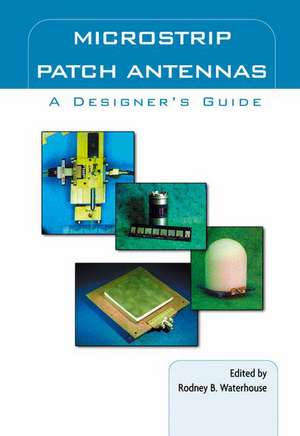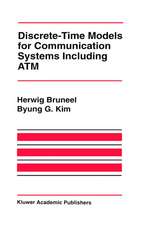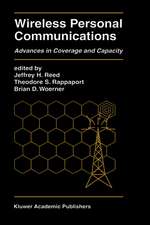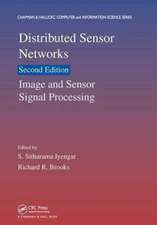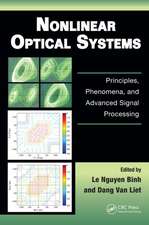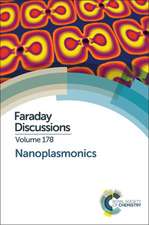Microstrip Patch Antennas: A Designer’s Guide
Autor Rod Waterhouseen Limba Engleză Hardback – 28 feb 2003
| Toate formatele și edițiile | Preț | Express |
|---|---|---|
| Paperback (1) | 1388.73 lei 43-57 zile | |
| Springer Us – 6 dec 2010 | 1388.73 lei 43-57 zile | |
| Hardback (1) | 1425.83 lei 43-57 zile | |
| Springer Us – 28 feb 2003 | 1425.83 lei 43-57 zile |
Preț: 1425.83 lei
Preț vechi: 1738.81 lei
-18% Nou
Puncte Express: 2139
Preț estimativ în valută:
272.84€ • 285.58$ • 227.08£
272.84€ • 285.58$ • 227.08£
Carte tipărită la comandă
Livrare economică 31 martie-14 aprilie
Preluare comenzi: 021 569.72.76
Specificații
ISBN-13: 9781402073731
ISBN-10: 1402073739
Pagini: 436
Ilustrații: XI, 421 p.
Dimensiuni: 156 x 234 x 29 mm
Greutate: 1.73 kg
Ediția:2003
Editura: Springer Us
Colecția Springer
Locul publicării:New York, NY, United States
ISBN-10: 1402073739
Pagini: 436
Ilustrații: XI, 421 p.
Dimensiuni: 156 x 234 x 29 mm
Greutate: 1.73 kg
Ediția:2003
Editura: Springer Us
Colecția Springer
Locul publicării:New York, NY, United States
Public țintă
ResearchDescriere
Microstrip Patch Antennas: A Designer's Guide provides the reader with a current overview of where microstrip patch antenna technology is at, and useful information on how to design this form of radiator for their given application and scenario. The book describes the general properties and the many different forms of microstrip patch antennas, highlighting the advantages and disadvantages of each from a designer's prospective. The book outlines procedures on how to optimize antennas in terms of bandwidth, size, polarization control and radiation performance. Practical design cases are provided for each goal.
Throughout the book, design philosophies are presented to ensure the best performance from the printed antenna is always achieved. Important performance trends are given, enabling the designer to understand what the most appropriate printed antenna solution exists for the problem at hand. Companies specializing in antenna development, using printed antennas in their systems and graduate students alike will find Microstrip Patch Antennas: A Designer's Guide is a useful tool.
Throughout the book, design philosophies are presented to ensure the best performance from the printed antenna is always achieved. Important performance trends are given, enabling the designer to understand what the most appropriate printed antenna solution exists for the problem at hand. Companies specializing in antenna development, using printed antennas in their systems and graduate students alike will find Microstrip Patch Antennas: A Designer's Guide is a useful tool.
Cuprins
Acknowledgements. 1: Introduction; R. Waterhouse. 1.1. History. 1.2. Advantages and Issues. 1.3. Applications. 1.4. Summary of Book. 1.5. Bibliography. 2: Fundamental Properties of Single Layer Microstrip Patch Antennas; R. Waterhouse, D. Novak, D.-K. Park, Y. Qian, T. Itoh. 2.1. Introduction. 2.2. General Theory of Operation and Design Tools. 2.3. The Effect of Conductor Shape. 2.4. Impedance and Radiation Performance of Single Layer Patches. 2.5. Excitation Methods of Microstrip Patches. 2.6. Circular Polarization Generation. 2.7. Summary. 2.8. Bibliography. 3: Enhancing the Bandwidth of Microstrip Patch Antennas; R. Waterhouse, J.T. Aberle, D. M. Kokotoff, A. Mitchell, M. Lech, S.D. Targonski, M. Lye, F. Zavosh, K. Ghorbani, D. Novak, A. Nirmalathas, C. Lim. 3.1. Introduction. 3.2. Intuitive Procedures. 3.3. Horizontally Coupled Parasitic Patches. 3.4. Stacked Patches. 3.5. Large Slot Excited Patches. 3.6. Aperture Stacked Patches. 3.7. Ultra-wideband ASPs. 3.8. Summary. 3.9. Bibliography. 4: Improving the Efficiency of Microstrip Patch Antennas; R. Waterhouse, D. Pavlickovski, D. M. Kokotoff, J.T. Aberle. 4.1. Introduction. 4.2. Surface Waves. 4.3. Patches that do not Excite TM Surface Waves. 4.4. Hi-lo Stacked Patches. 4.5. Photonic Band-gap Structures. 4.6. Summary. 4.7. Bibliography. 5: Small Microstrip Patch Antennas; R. Waterhouse, H.K. Kan, D.M. Kokotoff, S.D. Targonski, J.T. Rowley, D. Pavlickovski. 5.1. Introduction. 5.2. Shorted Microstrip Patches. 5.3. Further Size Reduction Techniques for Shorted Patches. 5.4. Winged Shorted Patch. 5.5. Shorted Spiral Patches. 5.6. Improving the Performances of Shorted Microstrip Patches. 5.7. Performance of Shorted Microstrip Patch Antennas for Mobile Communications Handsets at 1800 MHz. 5.8. Summary. 5.9. Bibliography. 6: Direct Integration of Microstrip Antennas; R. Waterhouse, W.S.T. Rowe, D. Novak, A. Nirmalathas, C. Lim. 6.1. Overview for Requirernents for Integration. 6.2. Slot Coupled Procedures and Solutions. 6.3. Direct Contact Procedures and Solutions. 6.4. Summary. 6.5. Bibliography. 7: Microstrip Patch Arrays; R. Waterhouse, K. Ghorbani, W.S.T. Rowe, S.D. Targonski, L. Mali, H.K. Kan, D. Novak, A. Nirmalathas, C. Lim. 7.1. Introduction. 7.2. Series Fed Arrays. 7.3. Parallel Fed Arrays. 7.4. Combination Fed Arrays. 7.5. Large Scanned Arrays of Microstrip Patches. 7.6. Alternatives to Large Arrays of Microstrip Patches. 7.7. Wraparound Patch Antenna Arrays. 7.8. Summary. 7.9. Bibliography. 8: Summary; R. Waterhouse. 8.1. Overview. 8.2. Future Directions of Microstrip Patch Technology. 8.3. Bibliography.List of Contributors.
